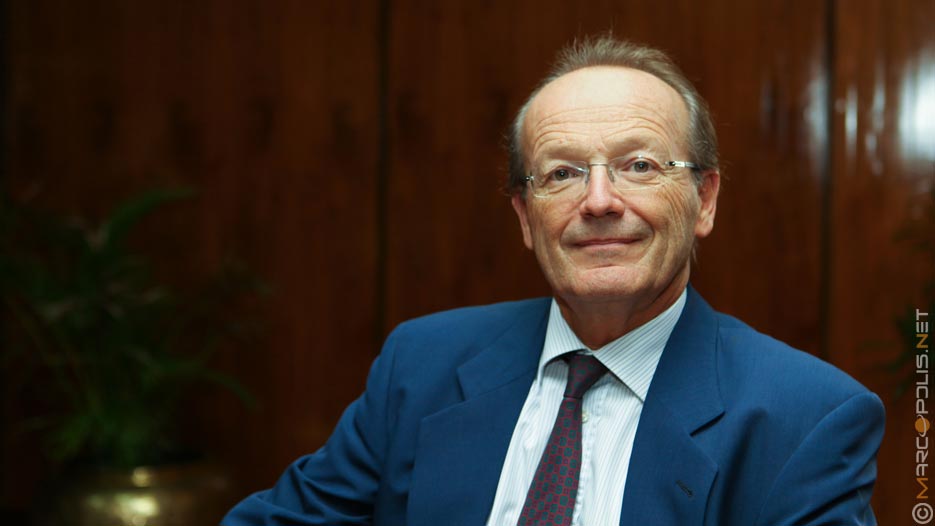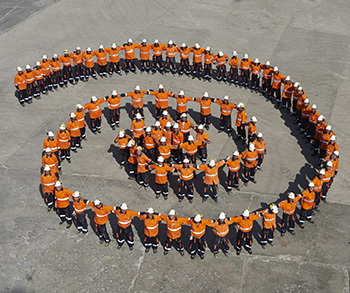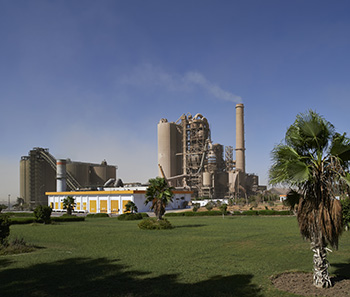The largest and oldest cement manufacturer in Egypt: Suez Cement
“We are in fact the largest cement manufacturer in the country. Our market share is slightly below 20%. We are not only the largest but also the oldest cement manufacturer, established in the early 1900s.”
Interview with Bruno Carre, CEO & MD of Suez Cement

What is your critical assessment of the industry at the moment?
We have gone through three or four years of difficulties but we are now much more confident about the prospects for the industry of building materials and construction in this country. This is mainly driven by a lot of large infrastructure projects that we are witnessing here and also by the basic needs in terms of housing that Egypt still has. In our sector we have also been facing a significant issue with the energy supply which has been causing a lot of problems limiting production capacity. We do see some improvements being made, especially through actions taken by companies such as ours that has been trying to not only diversify the energy supply but also to be able to generate its own energy supply.
Your company is one of the largest producers of cement in the country. How long have you been in the market? What is your market share?
We are in fact the largest cement manufacturer in the country. Our market share is slightly below 20%. We are not only the largest but also the oldest cement manufacturer, established in the early 1900s. We have been present in Egypt for nearly 100 years. Currently we have 5 plants. We grew by agglomerating some old companies and also by creating new sites, so now we have 5 plants, three companies, and a total capacity of 12 million tonnes of cement. We employ over three thousand people in the cement manufacturing business. For the last ten years we have been part of the Italcementi Group, which is one of the top five cement producers in the world. As a matter of fact we are one of the largest subsidiaries in the Italcementi Group in terms of size and growth potential.

Do you have any plans to increase the number of the plants?
So far, our plan is more in terms of being able to use our capacity to the full, which is not yet the case by a large margin. Possibly, if the market supports it, we plan to continue to grow in order to maintain our market share, perhaps by adding new plants or by adding new lines within the current plants.
We have very good geographical coverage in the country, so we can cover all of the geographic areas from our five plants, which is quite unique as most of our competitors are located in one single facility.
You produce both for the local market but also some of your production is being exported. Can you tell us a bit about your export market?
We are primarily a local business; we are taking local limestone which we cook and sell to the local market. It is a cheap product; it is one of the cheapest manufacturing products that you can imagine. 1kg of cement is worth less than one pound so it is very cheap. If you transport the cement, the transportation costs will rapidly become higher than the cost of the cement; thus it is not a product that you can export very far. We are working with some of the neighbouring countries. We used to work with Libya but right now Libya is going through some difficult times so the market is not only difficult but working there is also difficult. It will take some time before the exports can resume in a large way there. In any case, exports do not represent more than a few percent of our sales.
What are some of the largest projects that you are supplying with cement and building materials?
We have very good geographical coverage in the country, so we can cover all of the geographic areas from our five plants, which is quite unique as most of our competitors are located in one single facility.
Right now, we are mostly supplying the housing projects; there is a one million house project which is mostly coordinated by the military companies and then subcontracted to construction companies. We are actively supplying those companies with cement. There is a huge Suez Canal project that is not yet at the stage of consuming cement, but we anticipate that the cement construction stage will start early next year. We are working to be one of the key suppliers for this project.
What sets you apart from other cement producers in the country?
Beyond our size, we have a good geographical coverage; we are close to the different markets. We have the most extensive product range; we offer cement for different applications. Building a twenty storey apartment block is not the same as building a wharf in a harbour or a water treatment plant. We have the different kinds of cement for these different uses. We also try to develop good customer relations, in terms of customer support, bringing our customers new products and meeting their demands.
We have heard about your recent investment in a wind farm to tackle the energy crisis. How would you describe your overall approach to sustainable development?
For us, our commitment to sustainable development is very strong. We believe that we cannot sustain our activities in the countries where we operate without having some kind of a well-balanced relationship with the community that we are working in.  We have a commitment coming from our group CEO that we implement in these countries according to some of the group principles but also to the local needs. In terms of Egypt, this basically takes the form of a very strong commitment to environmental issues, not only to comply with the existing regulations but also to bring the same standards to Egypt as those that we are using everywhere else in the world. We aim to bring our Egyptian plants up to the same level of performance as the other plants that we have in other countries, both developed countries in Europe and developing countries in Asia. These standards cover energy issues, dust emissions, which are very critical for cement plants, water consumption, which is an important issue in a country like Egypt and also the ways that we work in terms of quarrying. We have started to implement biodiversity programs to work on rehabilitating the quarries. We also try to develop renewable energy from sources such as wind farms; we have several projects across the world with wind farms. Here in Egypt because of the favourable conditions we have a significant project to produce part of our energy supply from wind energy.
We have a commitment coming from our group CEO that we implement in these countries according to some of the group principles but also to the local needs. In terms of Egypt, this basically takes the form of a very strong commitment to environmental issues, not only to comply with the existing regulations but also to bring the same standards to Egypt as those that we are using everywhere else in the world. We aim to bring our Egyptian plants up to the same level of performance as the other plants that we have in other countries, both developed countries in Europe and developing countries in Asia. These standards cover energy issues, dust emissions, which are very critical for cement plants, water consumption, which is an important issue in a country like Egypt and also the ways that we work in terms of quarrying. We have started to implement biodiversity programs to work on rehabilitating the quarries. We also try to develop renewable energy from sources such as wind farms; we have several projects across the world with wind farms. Here in Egypt because of the favourable conditions we have a significant project to produce part of our energy supply from wind energy.
The other dimension to sustainable development relates to our employees. We have a very strong commitment to safety in our plants and we have made huge progress in this respect by training our employees in the correct processes and the correct tools in order to improve safety in the work place. We also spend a large amount of money to train our employees in different aspects from hard skills to soft skills. We believe in people and in growing people.
We also have corporate social responsibility, where we have a significant budget allocated mostly to education and health programs. We work with NGOs on programs that we select and that are close to the communities surrounding our plants. In this way we can have close contact with and make an impact on those communities. We have programs to improve schools, from elementary schools through to universities. We are currently renovating an elementary and middle school in the south of Cairo. We have partnerships with different universities and we have a strong involvement with vocational training in technical schools, which are really important when it comes to teaching young people skills that will help them to find a job rapidly. We also work closely with the hospitals to help them elevate their standards. Through the NGOs we are working on these kinds of programs.
What about your personal vision for this company? Where would you like to see the company in a few years?
I would like us to remain the leader of this industry and we are working hard on this. I want to continue implementing in Egypt the good practices that we are using worldwide. I want us to be supporting the strong demand from the construction industry. Egypt has been a country of builders for thousands of years and it still is. We strongly believe that we have a role to play in this and we want Egyptians to continue building but perhaps with more modern and sustainable materials.
And your personal vision for Egypt?
It is true that over the past few years, the country has been perceived from abroad as a difficult country to deal with and one that experiences a lot of fluctuations and changes in all senses. When you live inside the country, you have a strong sense of resilience. This country and the people of Egypt are very resilient. They have the creativity to always engineer solutions, sometimes short term and other times long term. There is a lot of energy in this country that will help Egypt to move forward. The situation is now stabilising very rapidly; the security issue is still not as good as it was but is not that bad and is much better than in many other countries around us. The economic perspective is improving, there are still challenges but the perspective is improving. I believe that this is the time to invest in this country.
FAIR USE POLICY
This material (including media content) may not be published, broadcasted, rewritten, or redistributed. However, linking directly to the page (including the source, i.e. Marcopolis.net) is permitted and encouraged.